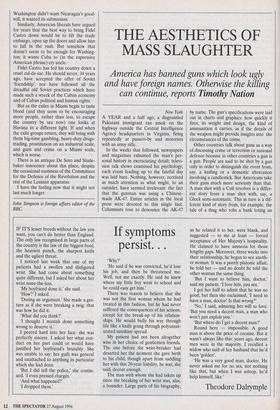If symptoms persist. . .
IF IT'S lesser breeds without the law you want, you can't do better than England. The only law recognised in large parts of the country is the law of the biggest boot, the heaviest punch, the sharpest knife and the ugliest threat.
I noticed last week that one of my patients had a swollen and disfigured wrist. She had come about something quite different, but I asked her about her wrist none-the-less.
`My boyfriend done it,' she said. `How?' I asked.
`During an argument.' She made a ges- ture as if she were breaking a twig: that was how he did it.
`What did you think?'
`I thought I mustah done something wrong to deserve it.'
I peered hard into her face: she was perfectly sincere. I asked her what con- duct on her part could or would have justified her boyfriend's brutality. She was unable to say: her guilt was general and unattached to anything in particular which she had done.
`But I did tell the police,' she contin- ued. 'I even pressed charges.'
`And what happened?'
`I dropped them.' 'Why?'
`He said if he was convicted, he'd lose his job, and then he threatened me. Well, not me exactly. He said he knew where my little boy went to school and he could easy get him.'
There was reason to believe that she was not the first woman whom he had treated in this fashion, but he had never suffered the consequences of his actions, except for the break-up of his relation- ships. He would bully his way through life like a knife going through polyunsat- urated sunshine spread.
My patient had not been altogether wise in her choice of gentlemen friends. The one before the wrist-breaker had deserted her the moment she gave birth to his child, though apart from saddling her with this 20-year liability, he was, she said, decent enough.
The man with whom she had taken up since the breaking of her wrist was, alas, a bounder. Large parts of his biography, as he related it to her, were blank, and suggested — to me at least — forced acceptance of Her Majesty's hospitality. He claimed to have amnesia for those lengthy gaps. Moreover, three weeks into their relationship, he began to see anoth- er woman. It was a purely platonic affair, he told her — and no doubt he told the other woman the same thing.
`But I want to believe him, doctor,' said my patient. 'I love him, you see.'
I got her half to admit that he was no good, but then she exclaimed, 'I need to have a man, doctor! Is that wrong?'
`No,' I said, admiring her will to love. `But you need a decent man, a man who won't just exploit you.'
`But where do I get a decent man?'
Round here — impossible. A good man is above the price of cocaine. But it wasn't always like this: years ago, decent men were in the majority. I recalled a widow who said of her husband that he'd been 'golden'.
`He was a very good man, doctor. He never asked me for no sex, nor nothing like that, but when I was asleep, he'd help himself, like.'
Theodore Dalrymple


























































 Previous page
Previous page